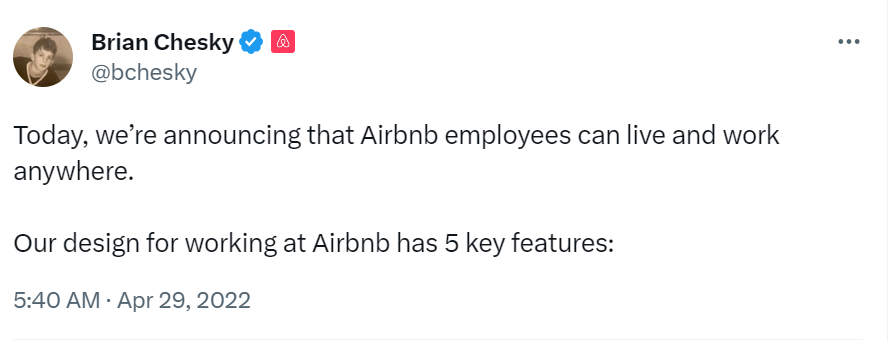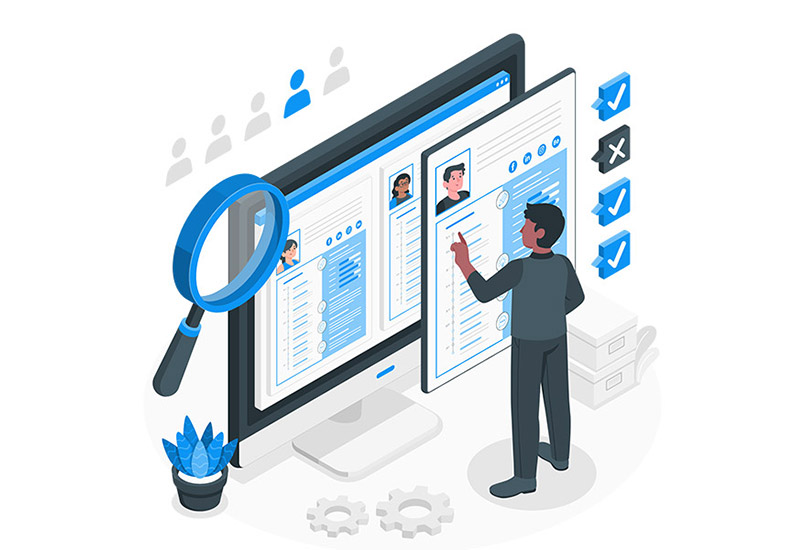The Future of Remote Work in Market Research: Unlocking the Potential of a Global Workforce to Drive Your Insights
Many industries have already embraced remote work and seen its benefits in terms of increased productivity and cost savings. In this article, we look at the implications of remote work and asynchronicity for market research, and how organizations can integrate these into the research process.
In April 2022, when Airbnb CEO Brian Chesky announced that their employees can “live and work anywhere”, the message was clear.
The Future of Work is already here, and it clearly reads Remote and Asynchronous.

For Knowledge industries like Market Research, this is almost a natural extension of how “work” was getting defined. Market researchers were already “working from anywhere” before the pandemic. The lockdown just gave an impetus to an already growing movement. Moreover, Gartner projects that 39% of global knowledge workers will be working in hybrid mode by the end of 2023.
Adoption of remote and asynchronous work is no longer a choice, but the minimum acceptable offering to attract and retain talent. However, it needs to be a well-considered organizational decision as it has several implications. Let’s explore some of these with respect to the market research industry.
Ask yourself: Is there a potential customer who believes in you?
First, let’s explore some of the benefits of remote work for the market research industry, both from the perspective of the client commissioning the research as well as that of the agency or expert providing the services.
1- Access to a Global Talent Pool
Remote work allows insight custodians and market research agencies to tap into a global talent pool. They can recruit and collaborate with insight experts and research professionals from different geographic locations, accessing a diverse range of perspectives and expertise in conducting research projects. This allows for a more comprehensive understanding of local market dynamics, consumer behavior, and business practices across various regions and demographics.
Remote work also enhances the ability to conduct market research, engage with customers from different regions, and analyze data in various languages. This local knowledge also facilitates more accurate and targeted research, ensuring that insights are relevant and actionable.
2- Better Allocation of Resources and Cost Efficiency
Hiring remote insight experts eliminates the need for client-side organizations and market research firms to recruit and train market researchers in-house. This can result in massive cost savings, as they can operate with a leaner structure and allocate resources more efficiently. This is especially true for smaller firms and startups which typically do not have large budgets and sustained requirements for research.
3- Asynchronous Work and Productivity Optimization
Remote work enables asynchronous collaboration, where researchers can work on different aspects of a project at their own pace. This approach allows experts to focus on specific tasks without interruptions, maximizing their productivity. Asynchronous work also accommodates different time zones, allowing for continuous progress on projects.
4- Expanded Reach for MR Professionals
Remote work allows market research firms and independent insight experts to expand their reach and offer services to clients beyond their local or regional boundaries. They can engage with clients from different countries or regions without the need for in-person meetings, thereby broadening their client base.
Adopting remote work and asynchronicity brings numerous benefits to both clients and researchers. However, in order to optimize the impact of this approach to work, it is important for client organizations and market research firms to embrace new ways of working. Let’s look at some of these next.
Embracing New Ways of Working When Adopting Remote Work
Choosing to hire remote workers for market research requires organizations and teams to reconsider practices and adopt new approaches to working together.
1- Adopt Enhanced Technology for Data Collection
Advancements in technology support remote data collection methods, such as online surveys, remote interviews, and virtual focus groups. Market researchers can leverage these tools to gather data from participants located anywhere in the world, reducing geographical limitations.
Adopting asynchronous research methods can also lead to higher response rates and improved participant recruitment. Participants have the flexibility to complete surveys or interviews at their convenience, increasing the likelihood of their engagement and participation in research studies.
2- Incorporate Evolving Research Techniques
Adopting remote work in market research means having to explore innovative research techniques that align with remote collaboration. For example, virtual reality (VR) and augmented reality (AR) can be used to simulate real-world environments for product testing or consumer research, even when participants are remote.
3- Adapt Expectations on Analysis and Reporting
Companies hiring remote researchers may need to adapt their expectations on analysis and reporting. Virtual communication tools, cloud-based platforms, and real-time data visualization tools can facilitate remote collaboration and help in delivering insights and reports efficiently. These tools also promote efficient exchange of ideas, knowledge sharing, and project progress tracking.
The adoption of remote work not only requires organizations and market research teams to rethink working styles but also requires them to implement certain strategies to integrate remote work into the research process. Let’s explore some key practices to incorporate.
Best Practices for Integrating Remote Work and Async Collaboration into the Research Process
Organizations can effectively integrate remote work and asynchronous collaboration into their research process by implementing these best practices.
1- Establish Clear Communication Channels
Choose reliable communication tools that support remote collaboration, such as video conferencing platforms like Zoom and instant messaging apps like Slack.
Ensure that both client and expert are familiar with the tools and establish guidelines for communication, including expected response times and preferred modes of communication.
2- Define Project Goals and Expectations
Clearly define project goals, objectives, and deliverables to ensure that remote market research analysts are aligned with the research objectives. Develop a clear research brief with guidelines on research methodology and restrictions, if any.
Establish a shared understanding of responsibilities and milestones. This clarity will help the remote expert work independently and contribute effectively to the overall research process.
3- Leverage Project Management and Collaboration Tools
Utilize collaboration tools that enable asynchronous work. Project management platforms like Trello, Asana, or Jira can help assign tasks, track progress, and manage workflows.
Document sharing and version control tools like Google Drive or Dropbox facilitate seamless collaboration on research documents and data.
4- Establish Regular Check-ins and Meetings
Schedule regular check-ins and meetings to sync up on project progress and address any questions or concerns. While asynchronous work is valuable, synchronous interactions are also important for real-time collaboration, clarification, and building trust.
5- Encourage Documentation and Knowledge Sharing
Maintain a cloud-based knowledge repository or a shared project wiki where clients and experts can access and contribute to relevant documentation.
Documenting key decisions, methodologies, and findings promotes transparency and facilitates collaboration. This also ensures that critical information is easily accessible and promotes continuity in the research process.
6- Ensure Data Security
Leveraging cloud-based storage and data-sharing platforms to maintain the confidentiality of client and participant data becomes a necessity. This centralization of data allows researchers to access relevant information easily, leading to streamlined workflows and faster data analysis.
Additionally, secure cloud storage ensures data security and reduces the risk of data loss or unauthorized access.
Making the move towards remote work can have numerous advantages for the market research industry. It can bring better allocation of resources and improve the efficiency of research practices. By leveraging the potential of a global workforce, companies seeking to do market research can access high-quality talent and unlock new opportunities in untapped markets.
However, it needs considered decision-making at the organizational level and requires embracing new ways of working, adoption of new technologies, and integration of best practices to overcome the challenges and maximize the benefits of remote work.
Call us to find out how InsightGig can help you with accessing global talent and streamlining the remote work process.





